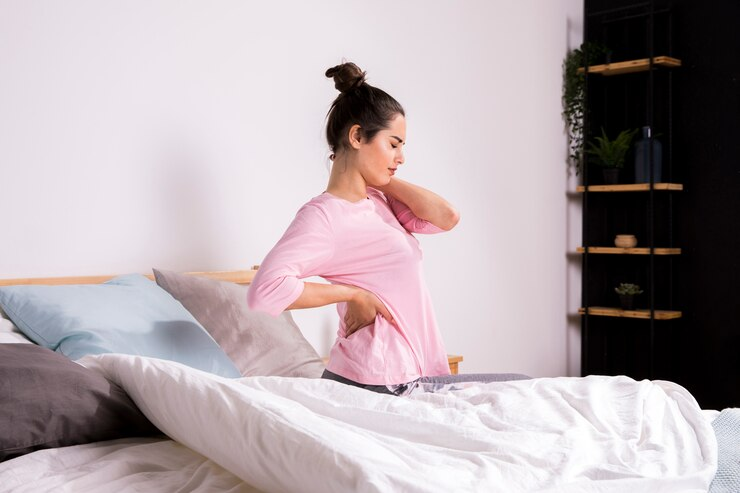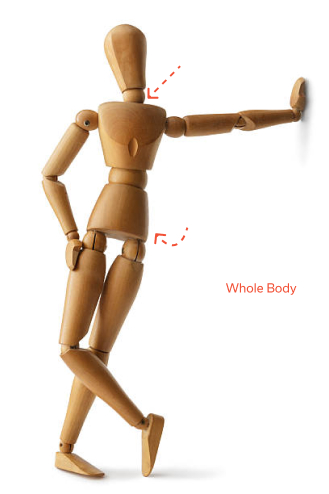Sleeping Positions for Slipped Disc Relief: Minimizing Discomfort
By Nigel ChuaSlipped discs, also known as herniated discs, can cause considerable discomfort and disruption in sleeping patterns. In Singapore, where individuals often lead busy lifestyles, managing herniated disc pain is crucial for maintaining productivity and quality of life. One way to minimize discomfort is to adopt a slipped disc sleeping position.
In this article, we will explore the best sleeping position for slipped disc relief and solutions for a good night's sleep.

Impact of Sleep on Herniated Disc Pain
Going about your daily life with a condition as painful and uncomfortable as disc herniation is already far from ideal. Disrupting your good night's sleep with a herniated disc makes it worse with every sharp, shooting pain from a sleeping position.
A herniated disc occurs when the soft inner core of a spinal disc protrudes through the tough outer layer, often due to aging, injury, or repetitive movements. This can lead to symptoms of burning pain, numbness, and tingling sensations, particularly in the lower back and legs.

Slipped disc physiotherapy in Singapore plays a vital role in managing these symptoms, offering targeted exercises and therapies to relieve pain and improve mobility. Most herniated discs complement pain medication and physiotherapy treatment plans without needing spine surgery. For this reason, many sought this solution to minimize slipped disc discomfort and sleep comfortably.
Physical therapy plus recommended sleep positions and lifestyle changes are practical solutions for recovery and comfort amidst slipped disc conditions.
How to Sleep with a Herniated Disc
Sleeping with a herniated disc can be an everyday challenge and cause severe pain. The way we sleep at night significantly impacts the severity of herniated disc symptoms. Poor sleeping position misaligns the spine, putting undue pressure on the spinal discs.
One in 10 herniated disc cases in Singapore requires surgery. Fortunately, it is possible to overcome the pain and discomfort through non-surgical methods.
To keep your spine in shape, Phoenix Rehab is a leading slipped disc physiotherapy provider in Singapore that tackles spinal health issues and solutions. Their comprehensive care and personalised treatment respond well to most herniated discs. Physical therapists provide proper sleep position suggestions to relieve herniated disc pain.
Below are some of the best sleeping positions to minimize discomfort and sleep comfortably even with slipped discs.
The Fetal Position
Known as the "curling up for comfort" position, this is a popular choice for many seeking relief from slipped disc pain. Lying on one side with the knees drawn towards the chest makes the spine naturally curved, relieving pressure on the discs.
You can achieve the fetal position by placing a pillow between the knees to support the proper alignment of the spine and enhance comfort.
Sleeping on the Side
Sleeping on the side with the knees slightly bent can help get the spine aligned and relieve pressure on the lower back. Placing a pillow between the knees can prevent the upper leg from pulling the spine out of alignment, encouraging a more neutral position.
Side sleepers particularly benefit from this position, reducing discomfort in the lower back.
Sleeping on the Back
Lying on your back is practically the best sleep position and most optimal for those with a bulging disc. This allows the entire spine to rest in a neutral position.
Placing a small pillow under the knees can help maintain the natural curve of the lower back and reduce strain on the spine. Back sleepers with herniated discs find extra support and comfort during sleep with this sleep position.
Reclining Position
The reclined position offers a viable alternative for those seeking relief from herniated disc discomfort, providing a supportive and comfortable sleeping option. This involves lying back in a semi-upright posture, with the upper back and body slightly elevated above the hips.
Consider using a reclining chair, wedge cushion, or an adjustable bed to achieve the supported reclining position effectively. These furniture pieces allow you to customize your preferred recline angle, ensuring optimal comfort and extra support.
Stomach Sleeping
Sleeping on the stomach can invite slipped disc symptoms as it puts a lot of pressure on the spine and strains the neck. This position puts pressure on the lumbar spine leading to increased discomfort. Opt for more supportive positions to relieve pressure and pain caused by herniated discs.
Try to avoid stomach sleeping, but if you're accustomed to sleeping on your stomach, there's no need to switch to another position forcefully. While not ideal for back pain, it can still work for herniated discs. Placing a small pillow under your lower abdomen and pelvis can alleviate pain in your spine.
Similarly, using a pillow under your head is also an option. This position can help reduce stress on the space between your discs.
Neutral Positions
This sleep position involves keeping the natural curves of the spine neutral or intact and avoiding excessive flexion or extension. Exercising relaxation techniques before bedtime can prepare the body for sleeping comfortably and relieve muscle spasms.
Utilize Supportive Aids
Supportive aids such as pillows, mattresses, and rolled-up towels provide herniated disc relief. A small pillow between the knees or under the lower back can provide extra support and help maintain proper spinal alignment. Similarly, placing a rolled-up towel under the lower back offers targeted lumbar support, reduces strain, and relieves pressure points.
In addition to addressing lower back discomfort, improper sleeping position can also cause neck pain. It's essential to maintain proper spinal alignment and avoid positions that strain the thoracic spine and nearby nerves.
Sleep Hygiene and Tips to Relieve Herniated Disc Pain
A good sleep hygiene practice can further enhance the effectiveness of a sleeping position for slipped disc relief. Establishing a consistent sleep schedule, creating a comfortable sleep environment, and practicing relaxation techniques before bedtime can promote restful sleep.
When you adjust your sleep position and adopt a bed routine, you can improve overall spinal health and sleep quality. Keep reading below for tips to minimize discomfort and pain from a herniated disc while sleeping.
- Stick to a Schedule. Consistency in sleep times regulates your body clock and promotes better sleep.
- Optimize Your Environment. Create a serene bedroom ambiance with cool, dark, and quiet surroundings.
- Find Supportive Positions. Ease leg pain and discomfort by exploring reclining positions with an adjustable bed or reclining chair.
- Choose the Right Pillow. Use a thinner pillow to maintain neck alignment and minimize strain on muscles during sleep. Memory foam pillows or wedge cushions can provide added support.
- Experiment with Positions. Test different sleeping positions for a herniated disc to discover what works best for your comfort.
- Practice Relaxation Techniques. Engage in deep breathing exercises or gentle stretches before bed to unwind and prepare your body for a restful night's sleep.
- Consult Medical Experts. Seek expertise from physiotherapists and health professionals for personal assessment and provide proper treatment and recommendations.
As per the National Institute of Health, most cases of disc herniation typically resolve within two to twelve weeks on average following injury. If you experience severe pain and numbness after the sixth week, it's time to seek medical attention.
Conclusion
The sleeping positions discussed in this article backed by science and studies give hope for improved sleep and comfort despite struggling with a herniated disc. The pain can be exasperating, but with these tips, you can take proactive steps toward managing the condition effectively.
However, it's essential to remain vigilant and consult with your healthcare provider if symptoms persist or worsen. Remember, your journey to relief is unique, and with the right support and guidance, you can reclaim control over your well-being and enjoy a better quality of life.
Browse other articles by category
Physiotherapy for Knee Pain Physiotherapy For Slipped Disc Physiotherapy for Neck Pain PHYSIOTHERAPY
PHYSIOTHERAPY
 Hand Therapy
Hand Therapy
 Alternative
Alternative
 Massage
Massage
 Traditional Chinese Medicine Treatment
Traditional Chinese Medicine Treatment
 Rehab
Rehab
 Physiotherapy For Lower Back Pain
Physiotherapy For Shoulder Pain
Orthopedic Doctors, Insurance & Healthcare
Physiotherapy For Upper Back Pain
Frozen Shoulder
Physiotherapy for Back Pain
Physiotherapy For Lower Back Pain
Physiotherapy For Shoulder Pain
Orthopedic Doctors, Insurance & Healthcare
Physiotherapy For Upper Back Pain
Frozen Shoulder
Physiotherapy for Back Pain

 Whatsapp us now
Whatsapp us now